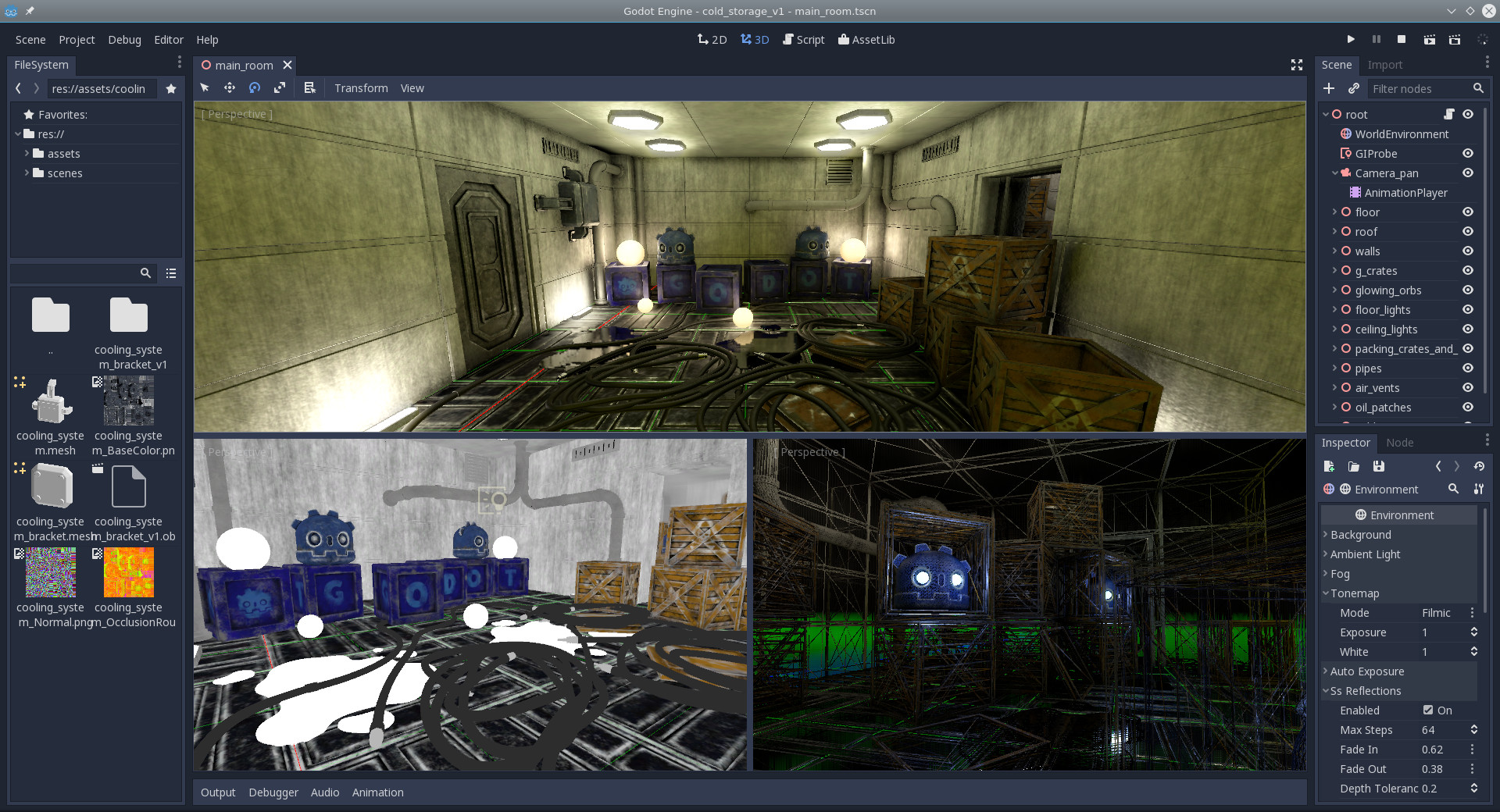With this change finally one can use compound collisions (like those created by Gridmaps) without serious performance issues. The previous KinematicBody code for Bullet was practically doing a whole bunch of unnecessary calculations. Gridmaps with fairly large octant sizes (in my case 32) can get up to 10000x speedup with this change (literally!). I expect the FPS demo to get a fair speedup as well. List of fixes and improvements: - Fixed a general bug in move_and_slide that affects both GodotPhysics and Bullet, where ray shapes would be ignored unless the stop_on_slope parameter is disabled. Not sure where that came from, but looking at the 2D physics code it was obvious there's a difference. - Enabled the dynamic AABB tree that Bullet uses to allow broadphase collision tests against individual shapes of compound shapes. This is crucial to get good performance with Gridmaps and in general improves the performance whenever a KinematicBody collides with compound collision shapes. - Added code to the broadphase collision detection code used by the Bullet module for KinematicBodies to also do broadphase on the sub-shapes of compound collision shapes. This is possible thanks to the dynamic AABB tree that was previously disabled and it's the change that provides the biggest performance boost. - Now broadphase test is only done once per KinematicBody in Bullet instead of once per each of its shapes which was completely unnecessary. - Fixed the way how the ray separation results are populated in Bullet which was completely broken previously, overwriting previous results and similar non-sense. - Fixed ray shapes for good now. Previously the margin set in the editor was not respected at all, and the KinematicBody code for ray separation was complete bogus, thus all previous attempts to fix it were mislead. - Fixed an obvious bug also in GodotPhysics where an out-of-bounds index was used in the ray result array. There are a whole set of other problems with the KinematicBody code of Bullet which cost performance and may cause unexpected behavior, but those are not addressed in this change (need to keep it "simple"). Not sure whether this fixes any outstanding Github issues but I wouldn't be surprised. |
||
|---|---|---|
| core | ||
| doc | ||
| drivers | ||
| editor | ||
| main | ||
| misc | ||
| modules | ||
| platform | ||
| scene | ||
| servers | ||
| thirdparty | ||
| .appveyor.yml | ||
| .clang-format | ||
| .editorconfig | ||
| .gitattributes | ||
| .gitignore | ||
| .mailmap | ||
| .travis.yml | ||
| AUTHORS.md | ||
| CHANGELOG.md | ||
| CODEOWNERS | ||
| CONTRIBUTING.md | ||
| COPYRIGHT.txt | ||
| DONORS.md | ||
| ISSUE_TEMPLATE.md | ||
| LICENSE.txt | ||
| LOGO_LICENSE.md | ||
| README.md | ||
| SConstruct | ||
| compat.py | ||
| gles_builders.py | ||
| icon.png | ||
| icon.svg | ||
| logo.png | ||
| logo.svg | ||
| methods.py | ||
| platform_methods.py | ||
| version.py | ||
README.md
Godot Engine
Homepage: https://godotengine.org
2D and 3D cross-platform game engine
Godot Engine is a feature-packed, cross-platform game engine to create 2D and 3D games from a unified interface. It provides a comprehensive set of common tools, so that users can focus on making games without having to reinvent the wheel. Games can be exported in one click to a number of platforms, including the major desktop platforms (Linux, Mac OSX, Windows) as well as mobile (Android, iOS) and web-based (HTML5) platforms.
Free, open source and community-driven
Godot is completely free and open source under the very permissive MIT license. No strings attached, no royalties, nothing. The users' games are theirs, down to the last line of engine code. Godot's development is fully independent and community-driven, empowering users to help shape their engine to match their expectations. It is supported by the Software Freedom Conservancy not-for-profit.
Before being open sourced in February 2014, Godot had been developed by Juan Linietsky and Ariel Manzur (both still maintaining the project) for several years as an in-house engine, used to publish several work-for-hire titles.
Getting the engine
Binary downloads
Official binaries for the Godot editor and the export templates can be found on the homepage.
Compiling from source
See the official docs for compilation instructions for every supported platform.
Community and contributing
Godot is not only an engine but an ever-growing community of users and engine developers. The main community channels are listed on the homepage.
To get in touch with the developers, the best way is to join the #godotengine IRC channel on Freenode.
To get started contributing to the project, see the contributing guide.
Documentation and demos
The official documentation is hosted on ReadTheDocs. It is maintained by the Godot community in its own GitHub repository.
The class reference is also accessible from within the engine.
The official demos are maintained in their own GitHub repository as well.
There are also a number of other learning resources provided by the community, such as text and video tutorials, demos, etc. Consult the community channels for more info.

